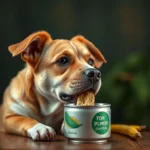
Introduction
Nutrition plays a pivotal role in the overall health and well-being of our canine companions. A well-balanced diet not only supports their physical health but also significantly impacts their skin and coat condition. A shiny, healthy coat is often a reflection of a dog’s internal health, and poor nutrition can lead to a plethora of skin issues. This article delves into the best dog foods for skin and coat health, exploring the nutritional components that contribute to a vibrant and healthy appearance in dogs.
Understanding Dog Nutrition
The Basics of Dog Nutrition
To appreciate how nutrition influences skin and coat health, it’s essential to grasp the fundamentals of dog nutrition. A complete dog diet consists of macronutrients and micronutrients.
- Macronutrients include:
- Proteins: Vital for growth, maintenance, and repair of body tissues, proteins are essential for a healthy coat. Sources include meat, fish, and eggs.
- Fats: Provide energy and are crucial for skin health. Healthy fats like Omega-3 and Omega-6 fatty acids help maintain a shiny coat and reduce inflammation.
-
Carbohydrates: While not essential, carbohydrates can provide energy and fiber. Whole grains and vegetables are preferred sources.
-
Micronutrients are equally important:
- Vitamins: Essential for various bodily functions, vitamins A, E, and B complex are particularly beneficial for skin and coat health.
-
Minerals: Minerals like zinc and selenium also support a healthy immune system and skin.
-
Water: Often overlooked, hydration is crucial for overall health and skin moisture. Access to fresh water should always be ensured.
Nutritional Needs by Life Stage
Each life stage of a dog requires specific nutritional considerations:
-
Puppy Nutrition: Growth requires higher protein and fat levels. Nutrients like DHA (docosahexaenoic acid) are vital for brain and vision development, and these contribute to healthy skin and coat.
-
Adult Dog Nutritional Needs: Balanced nutrition is crucial to maintain an adult dog’s health, focusing on maintaining a healthy weight and supporting skin and coat vitality.
-
Senior Dog Dietary Considerations: Older dogs may require diets lower in calories but higher in fiber to maintain gut health. Omega fatty acids are particularly important for joint and skin health in seniors.
How Nutrition Affects Skin and Coat Health
Common Skin and Coat Issues in Dogs
Dogs can suffer from various skin and coat issues, including:
- Dry Skin: Often caused by environmental factors or dietary deficiencies, dry skin can lead to itching and irritation.
- Allergies: Food allergies can manifest as skin irritations, requiring careful dietary management.
- Excess Shedding: Poor nutrition can lead to excessive shedding and dull fur.
Symptoms of these issues can include itching, flaking, and a lackluster coat. Identifying the root cause is essential for effective treatment.
Key Nutrients for Healthy Skin and Coat
Certain nutrients play a crucial role in maintaining healthy skin and a shiny coat:
- Omega Fatty Acids:
- Omega-3: Found in fish oil and flaxseed, Omega-3 fatty acids reduce inflammation, promoting skin and coat health.
-
Omega-6: Present in chicken fat and sunflower oil, Omega-6 fatty acids help maintain skin integrity.
-
Protein: High-quality protein sources provide the amino acids necessary for skin repair and coat health.
-
Vitamins:
- Vitamin A: Promotes skin cell production and repair.
- Vitamin E: An antioxidant that protects skin cells and promotes healing.
- B Vitamins: Important for overall skin health and coat shine.
Selecting the Best Dog Foods for Skin and Coat
Types of Dog Food Available
When choosing food for dogs, various options are available:
-
Dry Kibble: Convenient and shelf-stable, dry food can help keep teeth clean. Look for high-quality brands that list meat as the first ingredient.
-
Wet/Canned Food: Often more palatable for dogs, wet food can provide additional moisture, which is beneficial for skin health.
-
Raw Diets and Home-Cooked Meals: While these can be tailored to individual dog needs, they require careful planning to ensure nutritional balance.
Ingredients to Look For
When searching for the best dog foods for skin and coat, consider these key ingredients:
-
High-Quality Protein Sources: Look for identifiable meats like chicken, beef, or fish at the top of the ingredient list.
-
Essential Fatty Acids: Ingredients like fish oil and flaxseed are great sources of Omega-3 and Omega-6.
-
Antioxidants: Ingredients like blueberries and carrots provide vitamins and minerals that support skin health.
Ingredients to Avoid
Not all ingredients are beneficial. Avoid:
-
Common Allergens: Grains, certain meats, and artificial additives can trigger allergies in sensitive dogs.
-
Artificial Additives and Preservatives: Look for natural preservatives like tocopherols (Vitamin E) instead.
-
Low-Quality Fillers: Ingredients like corn and soy may not provide the necessary nutrients and can lead to digestive issues.
Top Recommended Dog Foods for Skin and Coat Health
Dry Dog Food Options
Several brands stand out for their focus on skin and coat health:
-
Orijen Original Dry Dog Food: High in protein and made with fresh, regional ingredients to support skin health.
-
Wellness CORE Grain-Free: Rich in Omega fatty acids and antioxidants, this formula promotes a healthy coat.
-
Blue Buffalo Life Protection Formula: Includes Omega-3 and Omega-6 fatty acids, vitamins, and minerals for comprehensive skin and coat support.
Wet Dog Food Options
Here are some wet food options that excel in supporting skin and coat:
-
Hill’s Science Diet Adult: Packed with Omega fatty acids and vitamins, it’s designed for overall health and a shiny coat.
-
Royal Canin Veterinary Diet: This formula is specially designed for dogs with skin sensitivities, providing the necessary nutrients for coat health.
Specialty Diets
For dogs with specific skin sensitivities, consider:
-
Canidae PURE Limited Ingredient Diet: This hypoallergenic formula is ideal for dogs with food allergies, focusing on minimal ingredients.
-
Taste of the Wild High Prairie Canine Recipe: Grain-free and rich in real roasted meats, this diet supports skin and coat through quality nutrition.
Homemade Dog Food and Supplements
Benefits of Homemade Dog Food
Creating homemade dog food can offer significant benefits:
-
Customization: Tailor meals to meet specific nutritional needs and preferences.
-
Ingredient Control: Choose high-quality, whole ingredients and avoid allergens.
Essential Supplements for Skin and Coat Health
In addition to quality dog food, supplements can enhance skin and coat health:
-
Fish Oil: Rich in Omega-3 fatty acids, fish oil promotes a healthy coat and reduces inflammation.
-
Biotin: Supports skin and coat health, preventing dryness and promoting shine.
Tips for Maintaining Healthy Skin and Coat in Dogs
Regular Grooming Practices
Routine grooming is vital for maintaining a healthy coat:
-
Brushing: Regular brushing helps distribute natural oils and remove dead hair, preventing matting and promoting shine.
-
Bathing: Use quality dog shampoos that are free of harsh chemicals. Consider oatmeal-based or hypoallergenic options for sensitive skin.
Regular Veterinary Check-ups
Routine vet visits are crucial for identifying potential skin issues early:
-
Skin Exams: Regular examinations can catch issues before they become serious.
-
Vaccinations and Treatments: Keeping up-to-date with vaccinations and treatments for parasites can significantly impact skin health.
Lifestyle Factors
Lifestyle choices also influence skin and coat health:
-
Exercise: Regular physical activity improves circulation, which can benefit skin health.
-
Environment: A clean, comfortable living environment helps prevent skin irritations.
-
Hydration: Ensure your dog has constant access to fresh water to keep their skin hydrated.
Conclusion
Proper nutrition is the cornerstone of maintaining a dog’s skin and coat health. By understanding the nutritional needs of dogs and selecting the best dog foods for skin and coat, owners can help their furry friends look and feel their best. Consulting with a veterinarian is highly recommended for personalized dietary advice tailored to your dog’s specific needs.









